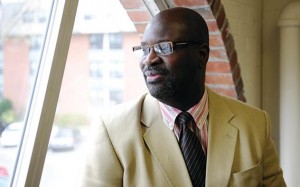The assistant director of Adelphi's Center for Nonprofit Leadership discusses his role and shares some of his hard-earned wisdom on nonprofit leadership and strategy.

A. Brian Leander, Ph.D., assistant director of Adelphi’s Center for Nonprofit Leadership
A. Brian Leander, Ph.D., is the assistant director of Adelphi’s Center for Nonprofit Leadership. He and his colleagues at the center provide training, coaching and strategy consulting to nonprofit leaders—including executive directors, boards of directors and emerging leaders—on Long Island.
Dr. Leander brings more than 20 years of experience in organizational development, leadership training and executive coaching to his position. Here, he discusses his role and shares some of his hard-earned wisdom on nonprofit leadership and strategy.
Most people have only a vague understanding of what an organizational development consultant/executive coach does. Can you boil it down?
I help nonprofit executives and boards overcome organizational dilemmas, formulate strategies and manage change to achieve their mission. Executive coaching extends traditional organizational development practices by supporting the executive through the first critical steps of implementing and managing change.
What initially attracted you to the field of organizational and leadership development?
I saw the field of organizational and leadership development as the best way for me to have the greatest positive impact on the lives of underserved people through organizations that provided needed programs and services to those communities.
You’ve been at Adelphi’s Center for Nonprofit Leadership since 2012. What attracted you to the center?
The center is uniquely positioned to draw upon the wide-ranging resources, relationships and credibility of an institution of higher education to build capacity for nonprofit organizations, especially by preparing emerging leaders to strategize and innovate.
What sets the Center for Nonprofit Leadership apart from similar organizations?
Uniquely, the center has been achieving its mission while being embedded in a university. In my four years at the center, several colleges and universities have reached out to me to explore how they could learn from the center to strengthen their community outreach initiatives.
What do you love most about your role at the Center for Nonprofit Leadership?
I love coming alongside nonprofit leaders who desire more and better outcomes for the people they serve. Making their burden lighter makes me happy.
You worked in Georgia for more than five years before coming back to New York. How would you compare the Empire State and the Peach State?
New York’s social sector and higher education community are unparalleled in the United States. But I admit I miss having more months of warm summer weather.
What makes an effective leader? What do effective leaders accomplish?
Leadership is the implicit promise that a person makes to advance the humanity of others by inspiring them to do good work. An effective leader is one who consistently follows through on this promise.
What issues do you find yourself most frequently addressing while working with nonprofit organizations?
Executives and boards often want similar outcomes for their organizations, although they might disagree about how to achieve those outcomes. I am frequently asked to help executives and boards to find a common groove, understanding or framework that allows them to fulfill their respective roles and achieve the organization’s mission.
How do you show leaders how to address those issues?
I work closely with each organization’s executive and board to develop a process that is responsive to their unique situation. Solutions frequently emerge from a facilitated strategic planning process, which involves the executive, board and other stakeholders. Sometimes it’s just a matter of coaching the executive toward finding a suitable resolution to a conflict among leaders around the direction the organization should take.
What is the most important piece of advice you can give to leaders?
Leaders cannot fulfill their full potential for impact if they do not practice self-care. I would advise leaders to keep up their fervor and stamina by maintaining transparent peer relationships and participating in a leadership learning community. These recommendations are about preparing for the long term; real transformation rarely takes place in the short term.
Who are the leaders you most admire?
The leaders I admire are not celebrated, praised or widely admired because they have not borne a title or led publicly. They are the authentic community leaders, the advocates for social justice and the tireless human rights campaigners.
For further information, please contact:
Todd Wilson
Strategic Communications Director
p – 516.237.8634
e – twilson@adelphi.edu